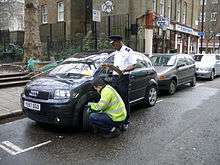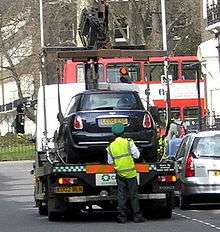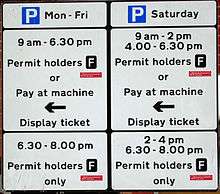Decriminalised parking enforcement


Decriminalised parking enforcement (DPE) is the name given in the United Kingdom to the civil enforcement of car parking regulations, carried out by civil enforcement officers, operating on behalf of either a local authority or a private firm. The Road Traffic Act 1991 (c. 40) provided for the decriminalisation of parking-related contraventions committed within controlled parking zones (CPZ) administered by local councils across the UK. The CPZs under the control of the local councils are also referred to as yellow routes and they can be easily identified with yellow lines marked on the roads with relevant time plates. Some councils employ parking attendants to enforce their CPZs directly while others contract their on-street parking enforcement to private companies.
The chief rationale behind this provision within the Act was, amongst other reasons, to make sure people didn't end up being criminalised for car parking offences, like one may potentially become with some driving offences. However, some parking offences can still be enforced by the police with fines, failure to comply with which could lead to criminal proceedings and even the adding of points on the driving licence of the offender. Such parking offences enforced by police traffic wardens are parking contraventions committed in red routes (red routes are usually identified with red lines marked on the roads with the relevant time plates). Police traffic wardens can also enforce parked vehicles on pedestrian zig-zags/crossings, whether committed on red or yellow routes.
Background
With increasing problems of town centre congestion, and demand for on-street parking, coupled with the pressures on police resources, and the low priority given by some police forces to the enforcement of parking regulations, the Road Traffic Act 1991 permitted local authorities to apply for the legal powers to take over the enforcement of, on-street, as well as off-street, car parking regulations from the police, in return they would be allowed to keep the proceeds. Thus in areas where DPE has been granted, parking offences cease to be criminal offences.
Without DPE, fixed penalties (not fines, because the recipient can exercise their right to a Court hearing instead) from the issue of parking tickets by the police is collected by Fixed Penalty Offices (each of which is part of a local Magistrates' Court in each county or metropolitan area) and passed directly to central government. With DPE in place, the local authority retains the income generated from parking penalties to finance parking enforcement and certain other activities such as local transport measures. Local authorities have been able to charge for on-street parking since 1958, but without the effective enforcement provided by DPE, such charging was of limited effect. Local authorities adopting DPE generally employ contractors to run their scheme.
The powers granted by DPE to deal with parking offences include:
- The issue of a Penalty Charge Notice (PCN) - a parking penalty which can be paid or contested by appeal (see below)
- The immobilisation of the vehicle - usually by clamping - until a release fee is paid
- The removal of the vehicle from the street
Appeals against council decisions on PCNs can be made to the Parking and Traffic Appeals Service (PATAS) in London, the Traffic Penalty Tribunal (TPT) in England and Wales, the Scottish Parking Appeals Service in Scotland and the Northern Ireland Traffic Penalty Tribunal in Northern Ireland. These bodies are tribunals established under DPE; appeals against their decisions can generally be made only on points of law, through judicial review. They are independent of the councils, albeit being funded by them in England and Wales through a fee of 60p per PCN issued. In Northern Ireland the Tribunal is operated by the Northern Ireland Court Service and all PCNs are issued by the Department for Regional Development as opposed to local councils.[1]
Revenue potential

Local authorities raise more than £1 billion a year from parking fines.[2][3] Some of the money raised goes into the costs of operating the system. Local authorities must report their income from parking fines and charges and must also state what any surplus is spent on. Typically the revenue from such schemes (if lost parking fees from infringing motorists are excluded) is greater than the cost of running the scheme and the surplus goes into the public purse, along with the parking fee income. The surplus revenue is ring-fenced to be used for transport related expenditure unless the Council is judged to be 'excellent' by the Audit Commission, in which case the surplus goes into the Council's general budget (as is the case for Kensington and Chelsea[4]). In 2005/6 the City of Westminster received GBP 65.4 million in parking revenue for on-street parking.[5] From one road in London, £3.2 million was raised in the year 2005-06.[2]
Some councils have used, attempted to use or been accused of attempting to use parking enforcement as a source of revenue.[6]
Benefits
Claimed benefits for DPE include:
- Less congestion due to lack of obstruction
- Higher turnover of parking spaces - thus easier to park
- Reduced pollution and fuel use due to less circulating traffic and less congestion
- Safer streets due to less circulating traffic
- Improved emergency service access due to less obstructed streets
- Reduced demands on police resources
Reform
The summary of an inquiry into parking policy and enforcement by the Transport Committee of the House of Commons[7] states:
In addition to the main task of introducing a unified system of parking enforcement in Britain, we have found that the following action is required:
- Clear performance standards in applying parking restrictions must be established
- It must be made clearer to drivers what regulations are in force and how compliance is to be achieved
- Appropriate recruitment, remuneration and training is needed to ensure a professional parking service throughout the country
- The process for challenging penalty charge notices must be made much more transparent
- The impact of the parking adjudication service must be increased and its profile heightened
- Scrutiny of local authority parking departments is woefully inadequate and needs to be strengthened
- Local authorities must develop parking strategies which meet local objectives fully, focusing particularly on congestion, road safety and accessibility.
See also
Notes
- ↑ Transport Committee (2005-09-01). "Memorandum submitted by Neil Herron on behalf of the Metric Martyrs Defence Fund". House of Commons.
- 1 2 David Millward (2006-10-27). "Streets where traffic wardens rule". The Daily Telegraph.
- ↑ Graeme Wilson (2006-06-22). "Motorists pay record £1bn parking bill". The Daily Telegraph. Retrieved 2008-01-27.
- ↑ "What happens to the money?". Parking matters. The Royal Borough of Kensington and Chelsea. July 2006.
- ↑ "Parking in Westminster - the facts" (Press release). Westminster City Council. 2006-06-21.
- ↑ "London council 'misleading' over 'illegal parking plan'". BBC News. BBC. 2010-01-20. Retrieved 2011-07-12.
- ↑ Transport Committee (2006-06-22). "Transport - Seventh Report: Parking Policy and Enforcement". House of Commons.
References
- Parking Legislation - A History from the website of the National Parking Adjudication Service for England and Wales
- London Assembly Inquiry: Decriminalised parking enforcement from the RAC Foundation
- Bill Garrett (2006-08-03). "Parking mad". BBC.
External links
- British Parking Association - Official website of the controversial Member Association representing organisations in the Parking and Traffic Management Industry.
- UK Parliament Transport Committee - Official website of the committee that examines the expenditure, administration and policy of the UK Department for Transport and its associated bodies
- New Parking Laws UK - Concise information and advice regarding parking laws in the UK since the introduction of DPE in 2008.